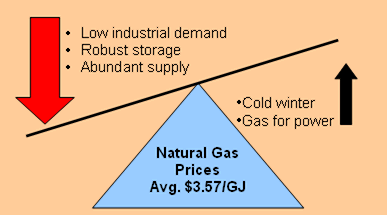Hedging Winter Term Gas Use
Winter Gas Pricing
What is the Winter (“Withdrawal”) Season?
The Withdrawal season consist of a 5 month season, November 1 to March 31, whereby the demand for natural gas is greater than the “injecting” supply. During the winter months Natural gas is pulled out of storage facilities to meet the peak winter heating demands of residential, commercial and Industrial end users.
Factors Influencing Natural Gas Prices:

(Source: EIA.GOV)
1) Weather: Typically the colder temperatures in winter spark an increase in demand for heating purposes. This increase in demand typically yields higher prices in the winter and as the demand tapers off come the warmer summer months, so does the price. However, an extremely warm summer can cause the price to rise as natural gas fired electricity generating plants ramp up to meet the air conditioning electricity needs. Warmer Winters on the other hand, as we experienced this last winter, result in less demand for natural gas for heating purposes. As demand falls, the supply stays stronger than expected resulting in downward pressure on natural gas prices.
2) Economy: The state of the economy (Primarily U.S) has a significant effect on the short term pricing of natural gas. Fairly straightforward, as the economy picks up so does demand and the same is true the in a downward economy.
What options are available to either hedge or budget for Winter Natural Gas Costs?
Direct Purchase Customers: As those clients who have sourced a supplier for their natural gas know, when the winter season approaches, you have choices for how you want to manage your natural gas pricing. Whether, you choose to lock in all your volumes at a given price for 2, 3 or even all 5 winter months, or only fix 50% of your gas usage as a hedge against rising costs the choice is in your hands. As many of our clients on Direct Purchase will attest, having the ability to manage your natural gas costs not only through the winter, but on a monthly basis, has a direct impact on their bottom line by having full control over what their summer and winter pricing looks like.
System (Utility) Supply: Using a system supply you have zero control over your winter term billing. The system is required to bill you every month for your gas usage. However, for those on system supply, you may be wondering: “won’t my summer rebate help mitigate any increased costs this winter?
The answer to that is ultimately NO. The biggest difference between Utility supply and CESi supply is that on the Utility you pay on a consumption basis (e.g. whatever you burn that month, you pay). This means the majority of consumers who use 80% or more of their natural gas in the winter, are only receiving the credit/rebate on 20% of their consumption. Therefore, clients that fit this kind of natural gas usage are effectively over paying in the winter only to be mildly reimbursed in the summer.
With CESi, you pay on a “deliveries” basis based on your Daily Contracted Quantity (DCQ). Your DCQ is calculated by taking the total of 12 months consumption, divide by 365, and you are left with the amount of gas you are anticipating to burn on average every day. The impact being for most natural gas users whose consumption is typically higher in the winter due to heating demand do not pay on their higher consumed volumes. Rather they are receiving an interest free gas loan. This loan is gradually reduced over the summer when natural gas prices historically soften. If your gas supply is still out of balance we can buy or sell gas on your behalf to avoid any penalties from the utilities. This gives you the most flexibility and allows you to forecast your upcoming gas costs!
Back to the differences between consumption and deliveries billings, we see that again as a user in a ABC contract, you have no control over the volume you are billed for each month. If your productions double in the winter term, you will be paying the full amount for your gas usage during the more expensive winter months. If you were on a CESi Strategic billing plan, we would be able to mitigate the high winter priced months with cheaper summer gas to bring your consumptions and deliveries into balance by year end all while successfully achieving an lower average price!
Sources
http://www.naturalgas.org/business/demand.asp#factorshort

